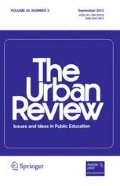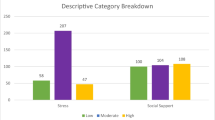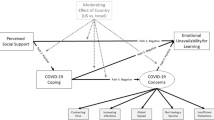Abstract
This study focuses on how personal support from the college environment influences the academic performance of African American and Latino college students attending selective colleges. Under-represented students at selective colleges continue to face challenges to their academic success, and support from the college environment is a key factor in the academic success of many of these students. The results indicate that it is important to distinguish between different forms of personal support and the race and gender of students receiving support. However, I find that the influence of faculty, specifically support from faculty of color, is important for the success of African American and Latino students at selective colleges.
Similar content being viewed by others
References
Bowen, W. G., & Bok, D. C. (1998). The shape of the river: Long-term consequences of considering race in college and university admissions. Princeton, NJ.: Princeton University Press.
Carter, P. L. (2005). Keepin’ it real: School success beyond black and white. New York: Oxford University Press, Inc.
Cheng, S., & Starks, B. (2002). Racial differences in the effects of significant others on students’ educational expectations. Sociology of Education, 75(4), 306–327.
Deil-Amen, R. (2011). Socio-academic integrative moments: Rethinking academic and social integration among two-year college students in career-related programs. Journal of Higher Education, 82(1), 54–91.
Delucchi, M. (1997). A mixed welcome: The impact of social integration on African-American student satisfaction with higher education. Sociological Viewpoints, 13, 2–15.
Dorsey, M. S., & Jackson, A. P. (1995). Afro-American students’ perceptions of factors affecting academic performance at a predominantly white school. Western Journal of Black Studies, 19(3), 189–195.
Durkheim, E. (1951). Suicide: A study in sociology (J. A. Spaulding & G. Simpson, Trans.). Glencoe, IL: Free Press (Original work published in 1897).
Fischer, M. J. (2007). Settling into campus life: Differences by race/ethnicity in college involvement and outcomes. Journal of Higher Education, 78(2), 125–161.
Gilardi, S., & Guglielmetti, C. (2011). University life of non-traditional students: Engagement styles and impact on attrition. Journal of Higher Education, 82(1), 33–53.
Gloria, A. M., Castellanos, J., Lopez, A. G., & Rosales, R. (2005). An examination of academic nonpersistence decisions of Latino undergraduates. Hispanic Journal of Behavioral Sciences, 27(2), 202–223.
Goodenow, C., & Grady, K. E. (1993). The relationship of school belonging and friends’ values to academic motivation among urban adolescent students. Journal of Experimental Education, 62(1), 60–71.
Gregory, S. T. (2003). Planning for the increasing number of Latino students. Planning for Higher Education, 31(4), 13–19.
Guiffrida, D. A. (2006). Toward a cultural advancement of Tinto’s theory. The Review of Higher Education, 29(4), 451–472.
Horvat, E. M., & Lewis, K. S. (2003). Reassessing the “burden of ‘acting white’’: The importance of peer groups in managing academic success. Sociology of Education, 76(4), 265–280.
Hurtado, S. (1992). The campus racial climate: Contexts of conflict. The Journal of Higher Education, 63(5), 539–569.
Jenkins, A. H., Harburg, E., Weissberg, N. C., & Donnelly, T. (2004). The influence of minority group cultural models on persistence in college. Journal of Negro Education, 73(1), 69–80.
Kao, G. (2001). Race and ethnic differences in peer influences on educational achievement. In E. Anderson & D. S. Massey (Eds.), Problem of the century: Racial stratification in the US (pp. 437–460). New York: Russell Sage Foundation.
Kobrak, P. (1992). Black student retention in predominantly white regional universities: The politics of faculty involvement. Journal of Negro Education, 61(4), 509–530.
Kuh, G. D., Cruce, T. M., Shoup, R., Kinzie, J., & Gonyea, R. M. (2008). Unmasking the effects of student engagement on first-year college grades and persistence. Journal of Higher Education, 79(5), 540–563.
Locks, A. M., Hurtado, S., Bowman, N., & Oseguera, L. (2008). Extending notions of campus climate and diversity to students’ transition to college. Review of Higher Education, 31(3), 257–285.
Massey, D. S., Charles, C. Z., Lundy, G., & Fischer, M. J. (2003). The source of the river: The social origins of freshmen at America’s selective colleges and universities. Princeton, NJ.: Princeton University Press.
Nagasawa, R., & Wong, P. (1999). A theory of minority students’ survival in college. Sociological Inquiry, 69(1), 76–90.
Nagda, B. A., Gregerman, S. R., Jonides, J., von Hippel, W., & Lerner, J. S. (1998). Undergraduate student-faculty research partnerships affect student retention. Review of Higher Education, 22(1), 55–72.
Ogbu, J. U. (1993). Differences in cultural frame of reference. International Journal of Behavioral Development, 16(3), 483–506.
Santos, S. J., & Reigadas, E. T. (2002). Latinos in higher education: An evaluation of a university faculty mentoring programs. Journal of Hispanic Higher Education, 1(1), 40–50.
Schneider, M. E., & Ward, D. J. (2003). The role of ethnic identification and perceived social support in Latinos’ adjustment to college. Hispanic Journal of Behavioral Sciences, 25(4), 539–554.
Smith, S., & Moore, M. (2002). Expectations of campus racial climate and social adjustment among African American college students. In W. Allen, M. Spencer, & C. O’Conner (Eds.), African American education: Race community, inequality, and achievement (pp. 93–118). NY: Elsever Science Ltd.
Steele, C. M. (1997). A threat in the air: How stereotypes shape intellectual identity and performance. American Psychologist, 52(6), 613–629.
Stinson, D. (2011). When the ‘burden of acting white’ is not a burden: School success and African American male students. Urban Review, 43(1), 43–65.
Tierney, W. G. (1992). An anthropological analysis of student participation in college. The Journal of Higher Education, 63(6), 603–618.
Tierney, W. G. (1999). Models of minority college-going and retention: Cultural integrity versus cultural suicide. Journal of Negro Education, 68(1), 80–91.
Tinto, V. (1993). Leaving college: Rethinking the causes and cures of student attrition. Chicago; London: University of Chicago Press.
Tyson, K., Darity, W, Jr, & Castellino, D. R. (2005). It’s not “a black thing”: Understanding the burden of acting white and other dilemmas of high achievement. American Sociological Review, 70(4), 582–605.
Washington, V., & Newman, J. (1991). Setting our own agenda: Exploring the meaning of gender disparities among blacks in higher education. The Journal of Negro Education, 60(1), 19–35.
White, J., & Lowenthal, P. R. (2010). Minority college students and tacit “codes of power”: Developing academic discourses and identities. Review of Higher Education, 34(2), 283–318.
Williamson, S. Y. (2010). Within-group ethnic differences of black male STEM majors and factors affecting their persistence in college. Journal of International & Global Studies, 1(2), 45–73.
Author information
Authors and Affiliations
Corresponding author
Rights and permissions
About this article
Cite this article
Baker, C.N. Social Support and Success in Higher Education: The Influence of On-Campus Support on African American and Latino College Students. Urban Rev 45, 632–650 (2013). https://doi.org/10.1007/s11256-013-0234-9
Published:
Issue Date:
DOI: https://doi.org/10.1007/s11256-013-0234-9




